|
Emmanuil N. Maragakis 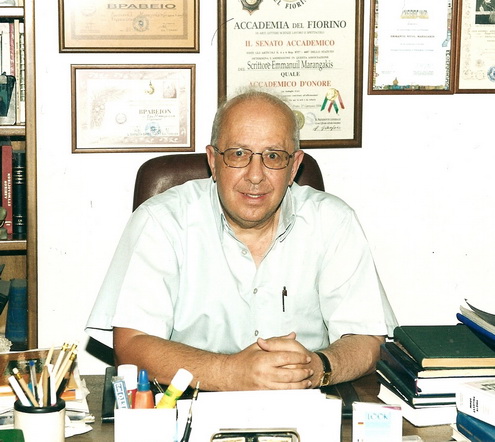
Professor, Litt.D. Philologist and Peacemaker 88 KYPROU - KYPSELI
113 61 ATHENS
GREECE http://www.marangakis.gr/primeengl.htm Two e-books (English language version) are presented in his site. 1. - Title, “Virgin Grounds & Religion beliefs”
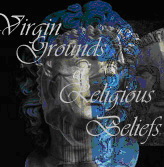
(free for non-commercial use) 2. - Title, “Abridged Encyclopedia of Philological Unveilings”
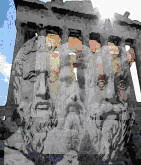
(free for non-commercial use) Bio He was born in Greece and in specific in the village of Acoumia Ag. Vasileiou Rethymnon, Crete, in the year 1940. He graduated from the Philosophical School of the University of Athens and served as a Secondary Education teacher from 1965 to 1991, when he decided to retire. In parallel to his teaching duties he occupied himself with his writing work, which he has served for thirty full years. To this day, he has completed the writing of 47 books of literary (and art-critic works), scientific and educative contents. Nineteen of his books have already been published and are already available in bookstores, whereas ten are already concluded and in press. In his ten in press books only essays and art-critic works are included and in those can be found innovations and progressive most revealing scientific openings following the aiming presented in his Greek and English versions of his already published "Abridged Encyclopedia of Philological Unveilings". The Academy of Florence has declared him Honorary Academic for his writing and cultural contribution and has awarded him with a relevant diploma. He was a candidate for the 2004 Nobel Prize in Literature. He was a candidate for the 2009 Nobel Prize in PEACE. He was awarded with 3 prizes and golden medals for my distinction as a personality by the International Company of Greek Authors, a foundation based in Athens and Brussels, during ceremonies that took place in the Cultural Center of the Municipality of Athens: 1) on March 2004, 2) on October 2004, as part of a three-day event celebrating the conclusion of the Athens' Olympic Games, 3) on March 2005. He was invited to participate as a congress member in the 19th World Poets' Congress in China, scheduled to take place late October to mid-November of the year 2005. This invitation was handed to only 150 members from around the world and came from the World Poets' Organization based in Carolina, U.S.A. Following an initiative of Chinese authorities he was chosen as one of the ten scientists from eighty countries around the globe that will receive a Ph. Litt. My application and relevant documents have already been sent to the proper authorities for the completion of this procedure. Under a joint decision of the Greek Ministry of Education, four of his books were approved as essential to all school libraries. It must be noted that he had submitted only four books and that, in terms of number of books, this fact is unprecedented. The Sovereign Order of St. John of Jerusalem, Knights of Malta, has honoured him with a diploma with which he is awarded with the rank and title of "Knight of Grace", validated in Malta with the Great Seal of the Order.
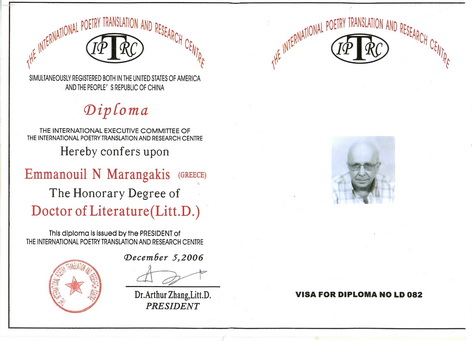
Published books
1.«Συντακτικό της Αρχαίας Ελληνικής Γλώσσας», Εκδόσεις «Κνωσσός», Αθήνα 1978, για καθηγητές κυρίως.
(“Syntactic of the Ancient Greek language”, ‘Knossos’ Editions, Athens 1978, mostly for teachers.) 2. «Η τεχνική των Εκθέσεων Ιδεών», Εκδόσεις «Γιάννης Β. Βασδέκης», Αθήνα 1980, για καθηγητές κυρίως. (“Essay Writing Techniques”, “John V. Vasdekis” Editions, Athens 1980, mostly for teachers.) 3.«Συντακτικό της Αρχαίας Ελληνικής», Αθήνα 1987, για μαθητές Λυκείου. (“Syntactic of Ancient Greek”, Athens 1987, for Lyceum students.) 4.«Η Ρητορική Τέχνη στην Ακμή της», Εκδόσεις «Γιάννης Β. Βασδέκης», Αθήνα 1991, τεχνοκριτικό. (“The Rhetorical Art in its Peak”, “John V. Vasdekis” Editions, Athens 1991, art-critic work) 5.«Η Πεμπτουσία του Αριστοτελικού Έργου «Περί Ποιητικής»», Εκδόσεις «Γρηγόρη», Αθήνα 1993, τεχνοκριτικό. (“The Quintessence of the Aristotelian work ‘On Poetic’”, “Grigoris” Editions, Athens 1993, art-critic work.) 6.«Πώς να μεταφράζετε τα Αρχαία Ελληνικά-Φιλολογικές θέσεις και Απανθίσματα», Εκδόσεις «Γιάννης Β. Βασδέκης», Αθήνα 1995, το β΄ μέρος δοκίμια. (“How to translate from Ancient Greek-Philological views and Anthologies”, “John V. Vasdekis” Editions, Athens 1995, the second part contains essays.) 7.«Η Σοφή Ανεκδοτολογία των Αρχαίων», Εκδόσεις «Γιάννης Β. Βασδέκης», Αθήνα 1996, Δοκίμια. (“TheWiseAncientRaconteurs”, “JohnV. Vasdekis” Editions, Athens 1996, Essays.) 8.«Η Αισθητική στο Λόγο», Εκδόσεις «Επικαιρότητα», Αθήνα 1998, Τεχνοκριτικό. (“The Aesthetics of Speech”, “Epikerotita” Editions, Athens 1998, Art-critic work.) 9.«Στοχασμοί ενός Συγγραφέα-Μέριμνα Επιλύσεων Προβληματισμών», Εκδόσεις «Γιάννης Β. Βασδέκης», Αθήνα 2000, Δοκίμιο. (“Reflections of a Writer-Care for Resolving Problematics”, “John V. Vasdekis” Editions, Athens 2000, Essay.) 10.«Εκλεκτική φιλοσοφία», Εκδόσεις «Γρηγόρη», Αθήνα 2001. (“Eclectic philosophy”, “Grigoris” Editions, Athens 2001.) 11.«Επίτομη Αρχαιοελληνική Συντακτική Εγκυκλοπαίδεια», Εκδόσεις «Γρηγόρη», Αθήνα 2002. (“Abridged Ancient-Greek Syntactic Encyclopedia”, “Grigoris” Editions, Athens 2002) 12.«Επίτομη Εγκυκλοπαίδεια της Ελληνικής Μυθολογίας», Εκδόσεις «Γρηγόρη», Αθήνα 2002. (“Abridged Encyclopedia of Greek Mythology”, “Grigoris” Editions, Athens 2002”) 13.«Μελλοντολογία και Ευαγγέλιο-Αυτοσυγκράτηση και Δόξα», Εκδόσεις «Γρηγόρη», Αθήνα 2002, Δοκίμιο. (“Futurism and the Gospel-Self-control and Glory”, “Grigoris” Editions, Athens 2002, Essay.) 14.«Επίτομη Εγκυκλοπαίδεια Φιλολογικών Αποκαλυπτηρίων», Εκδόσεις «Γρηγόρη», Αθήνα 2003, Δοκίμια. (“Abridged Encyclopedia of Philological Unveilings”, “Grigoris” Editions, Athens 2003, Essays.) 15.“Abridged Encyclopedia of Philological Unveilings”, “Grigoris” Editions, Athens 2003, Essays. 16.«Τα Σύν και τα Πλήν των Αρχαίων Ανεκδοτολογικώς», Εκδόσεις «Γρηγόρη», Αθήνα 2004, Δοκίμια. (“The Pros and Cons of the Ancient Raconteurs”, “Grigoris” Editions, Athens 2004, Essays.) 17.«Παρθένα Εδάφη του Θρησκευτικού Πιστεύω», Εκδόσεις «Οσελότος», τηλ. (210) 6431108, Αθήνα 2010, Δοκίμια. (“Virgin Grounds of Religious Beliefa”, “Oselotos” Editions, tel. (0030210) 6431108, Athens 2010, Essays.) 18.«Διαστροφικά και Ετεροφυλοφιλικά στην Αρχαιότητα», Εκδόσεις «Οσελότος», τηλ. (210) 6431108, Αθήνα 2010, Δοκίμια. (“Perversion and Heterosexuality in Antiquity”, “Oselotos” Editions, tel. (0030210) 6431108 Athens 2010, Essays.) 19.«Ηδονιστικά Θέλγητρα», Εκδόσεις «Οσελότος», τηλ. (210) 6431108, Αθήνα 2010, Δοκίμια. (“Hedonistic Allures”, “Oselotos” Editions, tel. (0030210) 6431108, Athens 2010, Essays.) 2o.«Μεταφυσικά Ανάλεκτα», Εκδόσεις «Οσελότος», τηλ. (210) 6431108, Αθήνα 2010, Δοκίμια. (“Metaphysical Analects”, “Oselotos” Editions, Athens 2010, tel. (0030210) 6431108, Essays.) 21.«Κοινωνική και Ιδιωτική Ζωή Ελλήνων και Ρωμαίων», Εκδόσεις «Οσελότος», τηλ. (210) 6431108, Αθήνα 2010, Δοκίμια. (“Social and Private Lives of Greeks and Romans”, “Oselotos” Editions, Athens 2010, tel. (0030210) 6431108, Essays.)
Unpublished works
"Δοκιμιακών Εκθεμάτων Κύκνειο Άσμα""The Swan Song of Essays"
"Εναύσματα""Sparks" "Έξαρση Στοχασμών" "Stochastic Outburst" "Φιλολογικά Αποκαλυπτήρια Δεύτερα" "PhilologicalUnveilings, Part 2" "Φιλολογικά Αποκαλυπτήρια Τρίτα" "PhilologicalUnveilings, Part 3" "Δοκιμιακή Μαγιά, Μέρος Πρώτο" "EssayYeast, Part 1" "Δοκιμιακή Μαγιά, Μέρος Δεύτερο" "EssayYeast, Part 2" "Δοκιμιακή Μαγιά, Μέρος Τρίτο" "EssayYeast, Part 3" "Δοκιμιακή Μαγιά, Μέρος Τέταρτο" "EssayYeast, Part 4" "Δοκιμιακή Μαγιά, Μέρος Πέμπτο" "EssayYeast, Part 5" "Δοκιμιακή Μαγιά, Μέρος Έκτο" "EssayYeast, Part 6" "Δοκιμιακή Μαγιά, Μέρος Έβδομο" "EssayYeast, Part 7" "Δοκιμιακή Μαγιά, Μέρος Όγδοο" "EssayYeast, Part 8" "Δοκιμιακή Μαγιά, Μέρος Ένατο" "EssayYeast, Part 9" "Δοκιμιακή Μαγιά, Μέρος Δέκατο" "EssayYeast, Part 10" "Δοκιμιακή Μαγιά, Μέρος Ενδέκατο" "EssayYeast, Part 11" "Δοκιμιακή Μαγιά, Μέρος Δωδέκατο" "EssayYeast, Part 12" "Δοκιμιακή Μαγιά, Μέρος Δέκατο Τρίτο" "EssayYeast, Part 13" "Δοκιμιακή Μαγιά, Μέρος Δέκατο Τέταρτο""EssayYeast, Part 14" "Δοκιμιακή Μαγιά, Μέρος Δέκατο Πέμπτο" "EssayYeast, Part 15" "Δοκιμιακή Μαγιά, Μέρος Δέκατο Έκτο" "EssayYeast, Part 16" "Δοκιμιακή Μαγιά, Μέρος Δέκατο Έβδομο" "EssayYeast, Part 17" "Δοκιμιακή Μαγιά, Μέρος Δέκατο Όγδοο" "EssayYeast, Part 18" "Δοκιμιακή Μαγιά, Μέρος Δέκατο Ένατο" "EssayYeast, Part 19" "Δοκιμιακή Μαγιά, Μέρος Εικοστό" "EssayYeast, Part 20" "Οι Ανταύγειες Θεσφάτων Συνθέτουν το Πορτρέτο Μου" "Reflections of Decrees Compose my Portrait"
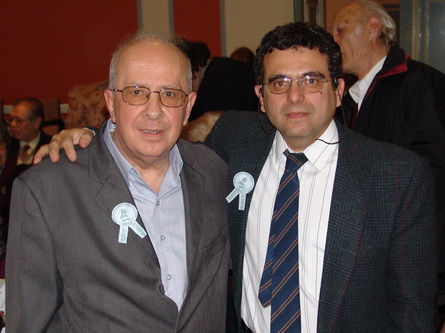
Emmanuil Maragakis with Takis Ioannides
--------------------------------------------------------------------------------------
Esteemed Mr Leo Semashko,
upon my response to the obligation to answer you
I convey to you my compliments and my harmonious and cordial wishes
for the success of your highest goals
implemented with full daily perpetual of your employment.
respectfully with harmonious wishes
Emmanuil N. Maragakis
---------------------------------------------------------------------------------------------
THE HARMONY OF GREEK PHILOSOPHY By Prof Emmanuel N. Maragakis, Dr of Literature There is the following variation between wisdom and philosophy, at least, in accordance with theviews of the ancient experts in the present. When we’re speaking about wisdom, we mean the intellectual integrity supposed that characterized the seven sages of ancient Greece. The first to use the “philosopher” terminology, so also called himself, was Pythagoras from Samos, and since the terminology was awarded with the meaning of thefriend of the spiritual quest, of the expectant of wisdom. The philosopher that with this definite meaning met the requirements of feasibility, fictional given for the meaning of wisdom, which specifies exclusively the divine. Is typical for the Greek reality that we can track, quite early, the doctrines of philosophy, as there are tangible proofs that Thales of Miletus (7th century b. C.), διετέλσεποδηγέτηςan first representative of the philosophical search, because, with starting point the logical, he reached naturalistic conclusions, the beginning of scientific thought, to be followed by a large number of philosophical personalities. The philosophy ministers to the full the spirituality, since it comprises the victualler of omnifarious knowledge, e.g. natural, physical, ethical, logical, astrological, geometrical, research, mathematics, technological, pedagogical, right-befittingand a number of others.In other words, its pioneers laid the bases of logic processing for everything and consequently of the scientific knowledge. But the cultivating of spirit was not end in itself, but additionally the vehicle of conception of theories able to meet the requirements of wellbeing either the simple, or the frugal living. Specifically, every philosophical school was proposing their own views, sometimes differentiated from philosopher to philosopher and sometimes conterminous and with convergence individual doctrines. These views were intended not only in the cultivation of intellect, but also in the bequeath of systems, manners to conduct, strengthening of the personality and ofthe mental constitution, attitude of the everyday, reaction to adverse circumstances, exemptionsfromcrustyattitudes, ethical reactions, treatment of manifold difficulties, dignified and calm attitude in the mater of death, cool treatment of the change of fortune to onerous, through exit from the impasses, formation of good crisis, and many other partial treatments. Due to existence of many important philosophers, multifarious philosophical currents were created, naturally the ancient Greek Philosophy flogged all issues of life and consequently all life dispositions were represented. And then, from ancient and posteriors, even them of our present times in global scale, he had selected the tendency, which would express him or it would be adaptable in the specificity of his temperament. In another case the person is moving selectively (selective philosophy) in all philosophical doctrines, from which he was borrowing the most beneficial and the most decent. There is even the named sector of the “Selective Philosophy”, which paternity is mentioned to philosopher Potamon οf Alexandria. I don’t consider irrelevant to call to attention that all religions without discrimination, even the Christian one, which is mainly represented by the “Gospel”, like the Mohammedanism by the “Koran”, are bifurcations of philosophical currents. All of them open horizons even for the lifestyle and the attitude. Consequently thereligious doctrines comprise outbreaks of philosophical sects. It depend on us to choose, based on our logic, our emotion, our aptitude, our temperament, plus by what is expressing us, by our lifestyle which is proceeded from all this swarm of philosophical and religious we mentioned above. The philosopher Aristippos of Cyrene, was referred to structured individual, which were neglected the philosophical approach, he compares them with the betrotheds of Penelope. These aspiring bridegrooms in spite of they had the ability to have under their manipulation any housemaid of the palace, at the same time they couldn’t be married with the mistress of the palace. So the measurement and the lengthening of the confluence of the philosophy was called to attention. I am ending with the addendum that in this selective philosophy is crowded not only the hand-picked, but even also all characterized by the accuracy, generally. Those who argue that the creation of philosophy has barbarian provenance, and not Greek provenance, bring into relief the point of view that in the initial section, it’s heresiarchs were the Magicians from the party of Persians, as pioneer and guide Zoroaster or Zarathustra, by the Babylonians and Assyrians the Chaldeans, by Indians the Gymnosophists, by Celts and Galatians the Druids and the Semnotheoi, and by Egyptians Vulcan, whom they epitomized as the clergy, in other words the priests and the prophets. The truth is that this point of view comprises the delusion, because the Greeks were the real chief-creators. In fact the exclusive brevet of the emergence of the philosophy prioryfrom others it’s gained over by Greeks. However, probably apply the following: a) Gymnosophists were philosophizing with enigmatic expression b) Magicians were considering as admissible, the man to play the role of bridegroom either his mother or his girlfriend and he was also trained in the augury. They used also to argue that good and evil spirit were real and that the humans will be come again in this world in the afterlife with ending with the immortality. Due to the sun and the sea were perceived as gods by the magicians, it was seemed natural Herodotus to be blamed for inaccuracies in his information that king Xerxes was hit the sun with his arc and tied the sea with chains. c) Chaldeans were dealing with astronomy and divination d) Egyptians philosophers were depicted the deified gods, the sun (Osiris) and the moon (Isis), with animals and were believed in reincarnation. They are considered as inventors of geometry, of arithmetic and astronomy. Who were called “seven Greek sages” are well known, who were pre-existed, and the philosopher were followed. Pythagoras in his meeting with the king of Sicyon or Flia’s Leo, he named himself “philosopher”, by which terminology it’s understood the Love and the pursuit of wisdom, the philosophic search. The terminology of wisdom presupposes the intellectual integrity, divine exclusivity. Ever since starts the chorus of philosophers. The dogmatic philosophers, those who argue that the things are familiar and comprehended, are opposite from the skeptic philosophers who are not adjudged for anything, after being characterized by the incomprehensibility for everything. And those philosophers who borrowed their name by their towns, in which they were living and acting, were named of Ilida, of Megara, of Eretria and of Cyrene. Academics and Stoic owe their name to the teaching sites. The Socratics and the Epicurean owe their name to their teachers. Physicists and physiologists owe their name on their involvement with nature. Ethical in their employment with moralistic themes. The Dialectic in the absorbance of the charm of the grounds. Natural philosophy is defined till epoch of Archelaus, the moral philosophy was initiated by Socrates, and the dialectical philosophy by Zeno of Elea. Plato established the ancient Academy, Arkesilaos established the middle and the Lakidis the new. All above were presented beforehand in general, without having to be expanded with hyper-exhaustivity in the details of the philosophical flows. Translation from Greek into English language by Takis Ioannides3 2 2011
Up
|